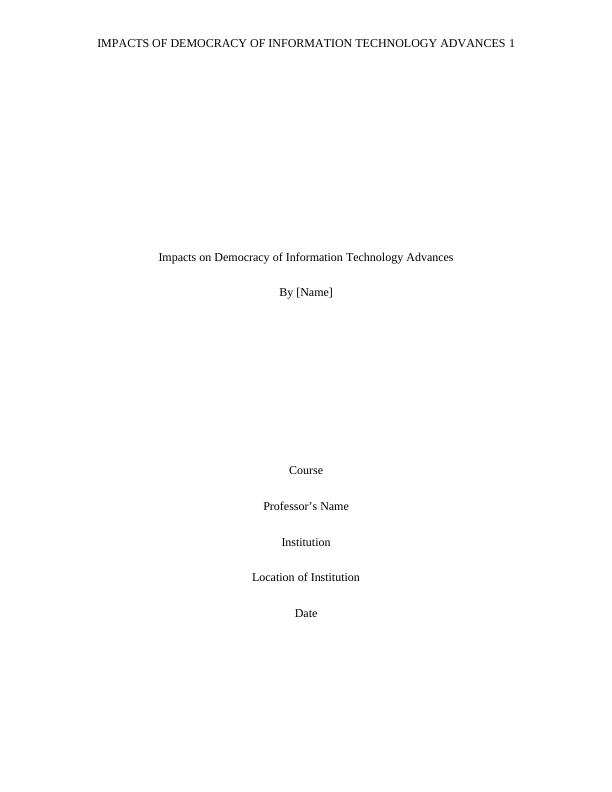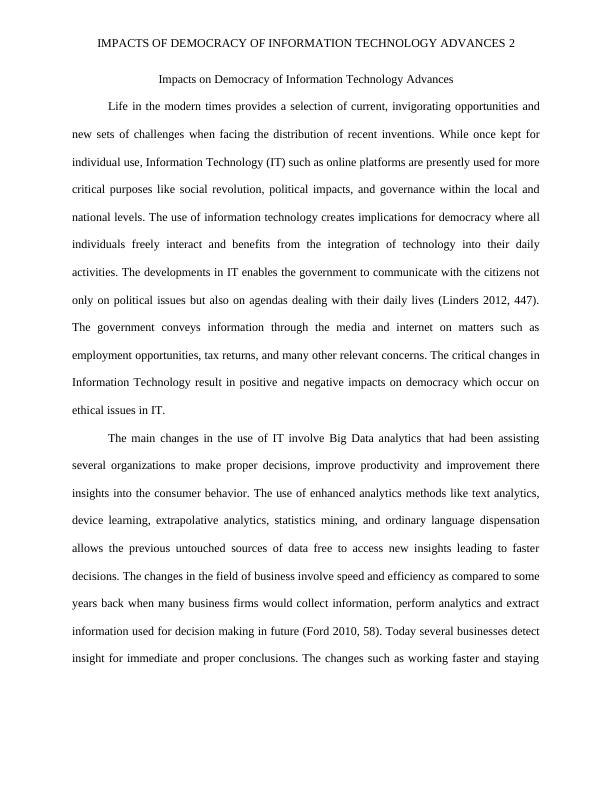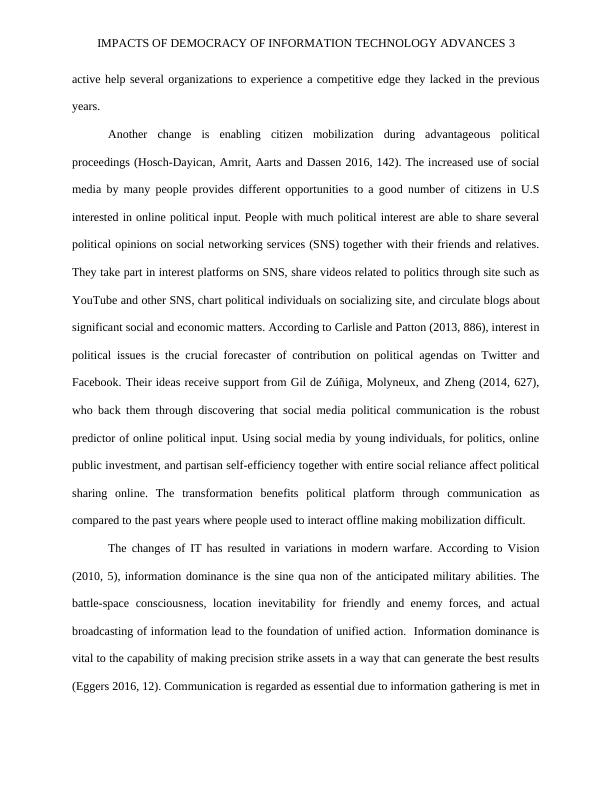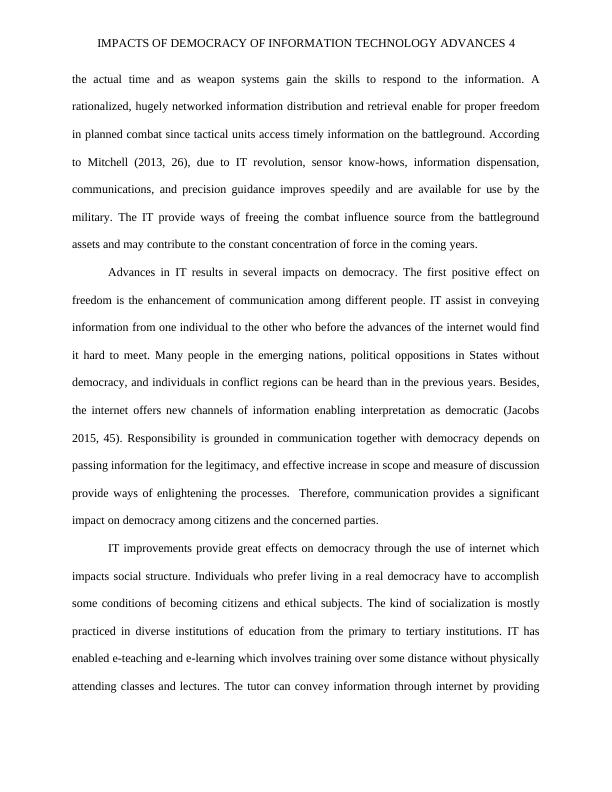The Use of Information Technology - PDF
11 Pages2694 Words111 Views
Added on 2021-05-31
The Use of Information Technology - PDF
Added on 2021-05-31
ShareRelated Documents
IMPACTS OF DEMOCRACY OF INFORMATION TECHNOLOGY ADVANCES 1Impacts on Democracy of Information Technology AdvancesBy [Name]Course Professor’s NameInstitutionLocation of InstitutionDate

IMPACTS OF DEMOCRACY OF INFORMATION TECHNOLOGY ADVANCES 2Impacts on Democracy of Information Technology AdvancesLife in the modern times provides a selection of current, invigorating opportunities andnew sets of challenges when facing the distribution of recent inventions. While once kept forindividual use, Information Technology (IT) such as online platforms are presently used for morecritical purposes like social revolution, political impacts, and governance within the local andnational levels. The use of information technology creates implications for democracy where allindividuals freely interact and benefits from the integration of technology into their dailyactivities. The developments in IT enables the government to communicate with the citizens notonly on political issues but also on agendas dealing with their daily lives (Linders 2012, 447).The government conveys information through the media and internet on matters such asemployment opportunities, tax returns, and many other relevant concerns. The critical changes inInformation Technology result in positive and negative impacts on democracy which occur onethical issues in IT.The main changes in the use of IT involve Big Data analytics that had been assistingseveral organizations to make proper decisions, improve productivity and improvement thereinsights into the consumer behavior. The use of enhanced analytics methods like text analytics,device learning, extrapolative analytics, statistics mining, and ordinary language dispensationallows the previous untouched sources of data free to access new insights leading to fasterdecisions. The changes in the field of business involve speed and efficiency as compared to someyears back when many business firms would collect information, perform analytics and extractinformation used for decision making in future (Ford 2010, 58). Today several businesses detectinsight for immediate and proper conclusions. The changes such as working faster and staying

IMPACTS OF DEMOCRACY OF INFORMATION TECHNOLOGY ADVANCES 3active help several organizations to experience a competitive edge they lacked in the previousyears. Another change is enabling citizen mobilization during advantageous politicalproceedings (Hosch-Dayican, Amrit, Aarts and Dassen 2016, 142). The increased use of socialmedia by many people provides different opportunities to a good number of citizens in U.Sinterested in online political input. People with much political interest are able to share severalpolitical opinions on social networking services (SNS) together with their friends and relatives.They take part in interest platforms on SNS, share videos related to politics through site such asYouTube and other SNS, chart political individuals on socializing site, and circulate blogs aboutsignificant social and economic matters. According to Carlisle and Patton (2013, 886), interest inpolitical issues is the crucial forecaster of contribution on political agendas on Twitter andFacebook. Their ideas receive support from Gil de Zúñiga, Molyneux, and Zheng (2014, 627),who back them through discovering that social media political communication is the robustpredictor of online political input. Using social media by young individuals, for politics, onlinepublic investment, and partisan self-efficiency together with entire social reliance affect politicalsharing online. The transformation benefits political platform through communication ascompared to the past years where people used to interact offline making mobilization difficult.The changes of IT has resulted in variations in modern warfare. According to Vision(2010, 5), information dominance is the sine qua non of the anticipated military abilities. Thebattle-space consciousness, location inevitability for friendly and enemy forces, and actualbroadcasting of information lead to the foundation of unified action. Information dominance isvital to the capability of making precision strike assets in a way that can generate the best results(Eggers 2016, 12). Communication is regarded as essential due to information gathering is met in

IMPACTS OF DEMOCRACY OF INFORMATION TECHNOLOGY ADVANCES 4the actual time and as weapon systems gain the skills to respond to the information. Arationalized, hugely networked information distribution and retrieval enable for proper freedomin planned combat since tactical units access timely information on the battleground. Accordingto Mitchell (2013, 26), due to IT revolution, sensor know-hows, information dispensation,communications, and precision guidance improves speedily and are available for use by themilitary. The IT provide ways of freeing the combat influence source from the battlegroundassets and may contribute to the constant concentration of force in the coming years. Advances in IT results in several impacts on democracy. The first positive effect onfreedom is the enhancement of communication among different people. IT assist in conveyinginformation from one individual to the other who before the advances of the internet would findit hard to meet. Many people in the emerging nations, political oppositions in States withoutdemocracy, and individuals in conflict regions can be heard than in the previous years. Besides,the internet offers new channels of information enabling interpretation as democratic (Jacobs2015, 45). Responsibility is grounded in communication together with democracy depends onpassing information for the legitimacy, and effective increase in scope and measure of discussionprovide ways of enlightening the processes. Therefore, communication provides a significantimpact on democracy among citizens and the concerned parties.IT improvements provide great effects on democracy through the use of internet whichimpacts social structure. Individuals who prefer living in a real democracy have to accomplishsome conditions of becoming citizens and ethical subjects. The kind of socialization is mostlypracticed in diverse institutions of education from the primary to tertiary institutions. IT hasenabled e-teaching and e-learning which involves training over some distance without physicallyattending classes and lectures. The tutor can convey information through internet by providing

End of preview
Want to access all the pages? Upload your documents or become a member.
Related Documents
Impact of Democracy on Information Technologylg...
|8
|2582
|22
Freedom of Expression for all without censorship and fetters at Twitterlg...
|10
|2425
|415
Media, Politics and Governancelg...
|7
|1838
|145
Research Report On Democracy & Internetlg...
|7
|2948
|228
Impact of Fake News on People's Daily Lifelg...
|6
|1247
|163
Digital Citizenship and the Relationship between Publicity, Democracy and Citizenshiplg...
|11
|3481
|339
